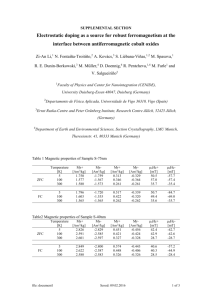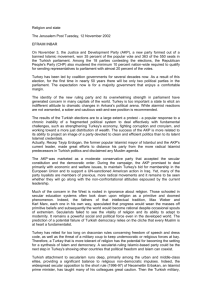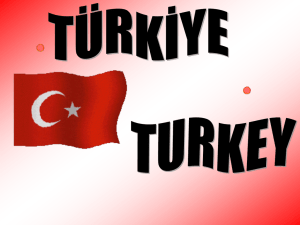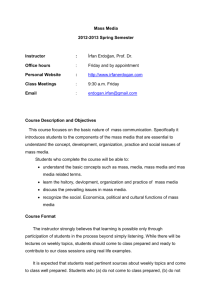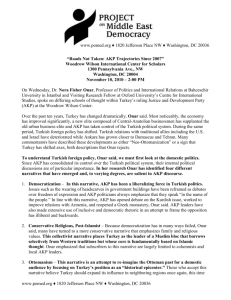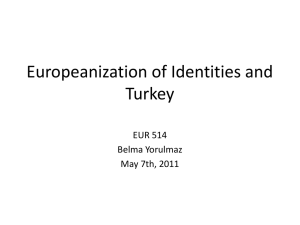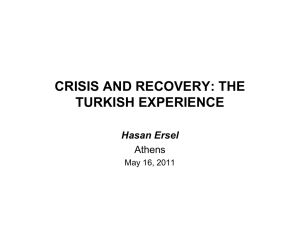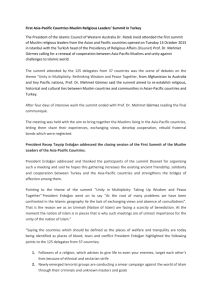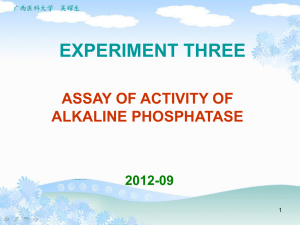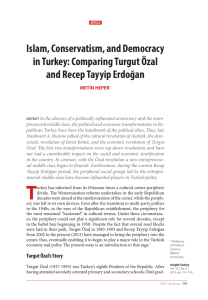Turkey votes: Part II – Erdoğan reloaded
advertisement
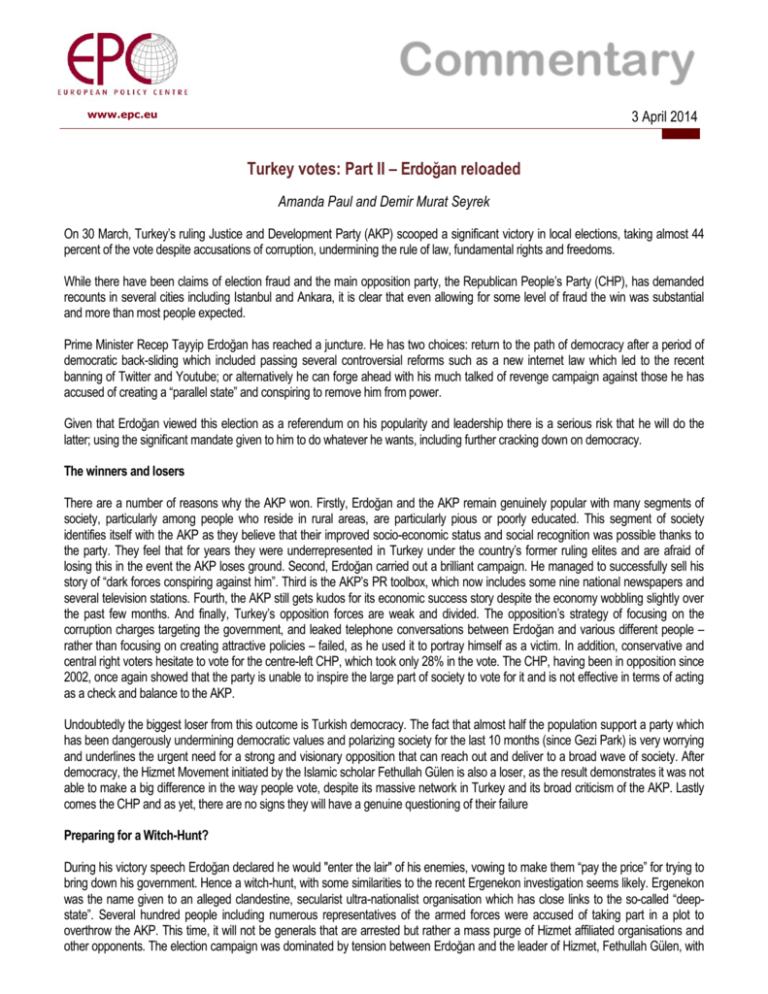
3 April 2014 www.epc.eu Turkey votes: Part II – Erdoğan reloaded Amanda Paul and Demir Murat Seyrek On 30 March, Turkey’s ruling Justice and Development Party (AKP) scooped a significant victory in local elections, taking almost 44 percent of the vote despite accusations of corruption, undermining the rule of law, fundamental rights and freedoms. While there have been claims of election fraud and the main opposition party, the Republican People’s Party (CHP), has demanded recounts in several cities including Istanbul and Ankara, it is clear that even allowing for some level of fraud the win was substantial and more than most people expected. Prime Minister Recep Tayyip Erdoğan has reached a juncture. He has two choices: return to the path of democracy after a period of democratic back-sliding which included passing several controversial reforms such as a new internet law which led to the recent banning of Twitter and Youtube; or alternatively he can forge ahead with his much talked of revenge campaign against those he has accused of creating a “parallel state” and conspiring to remove him from power. Given that Erdoğan viewed this election as a referendum on his popularity and leadership there is a serious risk that he will do the latter; using the significant mandate given to him to do whatever he wants, including further cracking down on democracy. The winners and losers There are a number of reasons why the AKP won. Firstly, Erdoğan and the AKP remain genuinely popular with many segments of society, particularly among people who reside in rural areas, are particularly pious or poorly educated. This segment of society identifies itself with the AKP as they believe that their improved socio-economic status and social recognition was possible thanks to the party. They feel that for years they were underrepresented in Turkey under the country’s former ruling elites and are afraid of losing this in the event the AKP loses ground. Second, Erdoğan carried out a brilliant campaign. He managed to successfully sell his story of “dark forces conspiring against him”. Third is the AKP’s PR toolbox, which now includes some nine national newspapers and several television stations. Fourth, the AKP still gets kudos for its economic success story despite the economy wobbling slightly over the past few months. And finally, Turkey’s opposition forces are weak and divided. The opposition’s strategy of focusing on the corruption charges targeting the government, and leaked telephone conversations between Erdoğan and various different people – rather than focusing on creating attractive policies – failed, as he used it to portray himself as a victim. In addition, conservative and central right voters hesitate to vote for the centre-left CHP, which took only 28% in the vote. The CHP, having been in opposition since 2002, once again showed that the party is unable to inspire the large part of society to vote for it and is not effective in terms of acting as a check and balance to the AKP. Undoubtedly the biggest loser from this outcome is Turkish democracy. The fact that almost half the population support a party which has been dangerously undermining democratic values and polarizing society for the last 10 months (since Gezi Park) is very worrying and underlines the urgent need for a strong and visionary opposition that can reach out and deliver to a broad wave of society. After democracy, the Hizmet Movement initiated by the Islamic scholar Fethullah Gülen is also a loser, as the result demonstrates it was not able to make a big difference in the way people vote, despite its massive network in Turkey and its broad criticism of the AKP. Lastly comes the CHP and as yet, there are no signs they will have a genuine questioning of their failure Preparing for a Witch-Hunt? During his victory speech Erdoğan declared he would "enter the lair" of his enemies, vowing to make them “pay the price” for trying to bring down his government. Hence a witch-hunt, with some similarities to the recent Ergenekon investigation seems likely. Ergenekon was the name given to an alleged clandestine, secularist ultra-nationalist organisation which has close links to the so-called “deepstate”. Several hundred people including numerous representatives of the armed forces were accused of taking part in a plot to overthrow the AKP. This time, it will not be generals that are arrested but rather a mass purge of Hizmet affiliated organisations and other opponents. The election campaign was dominated by tension between Erdoğan and the leader of Hizmet, Fethullah Gülen, with Erdoğan accusing him of setting up a “parallel state” within the judiciary and police with the aim of overthrowing the government. Having already purged thousands of police and hundreds of judges and prosecutors he will now work to finish the job. Despite the fact that there are no legal grounds to carry out such an investigation, Erdoğan will claim that he was elected to eliminate the “parallel state”. This pre-election tension was indeed not unique for Hizmet. Turkish media and several business groups openly criticised Erdoğan and the way he demonized Hizmet as a “parallel state” in order to cover up corruption claims. There were also similar criticism from the EU and US. What lies ahead? Beyond seeking revenge, Erdoğan is focused on up-coming August Presidential elections and 2015 parliamentary elections. In June the campaign for the Presidential elections will begin. At this point it is not clear whether or not Erdoğan will run. Given that AKP did not take over 50% in the local elections this may make him more cautious as he will not want to face political defeat. Hence, current President, Abdullah Gül, may run for a second term. In this case, Erdoğan will focus on a fourth term as Prime Minister although this will involve amending an internal AKP rule. It is possible that Erdoğan may call for early elections, striking while the iron is hot. Unless over the coming months a new centre-right party is born, or the CHP manages to “reinvent itself”, there seems every possibility that the AKP could have a further victory. However, while Erdoğan is more comfortable in his chair after the local elections, he nevertheless faces a number of significant challenges: Economic situation: Turkey’s international image has deteriorated over the last few months. A “witch-hunt” or new restrictions on freedom of expression, risk further worsening the situation. Despite the fact that the markets responded positively to the election results, the longer-term impact of ongoing turmoil is cause for concern and risk undermining the economy including FDI. Taking into account that economic stability and the improved socio-economic conditions of certain segments of society have been a crucial element of the AKP’s success story, economic problems could affect the level of the AKPs support. Foreign policy challenges: As Erdoğan has adopted an increasingly authoritarian approach to governance, while also becoming more unpredictable, in terms of foreign policy strategy, relations with traditional allies such as the US and EU have suffered, eroding trust. Unless this situation is rectified, Erdoğan may find it difficult to adequately deal with a number of serious regional challenges related to Syria, Egypt, the Cyprus peace negotiations and Iran all of which could have serious consequence for both Turkey and the West. Hence, there is a need for the West to maintain strong engagement with Ankara, and encourage the government to return to the democratic track. Polarisation of society Erdoğan consciously contributed to the polarisation of the country in order to consolidate AKP supporters. However, this may ultimately work against him. Polarization has left over half of Turkey’s population angry, insecure and anxious about their future and that of their country. When this is combined with the increasing activism among young people, it seems set to create a resistance in society against further restrictions on freedoms. Young and well educated Turks have major concerns about the future of Turkey and the 2013 Gezi Park protests proved that their number is not as small as it was believed. They embrace democratic values and they are ready to defend their rights. Their active participation as voluntary election observers, the first time in the history of Turkey, and their large democracy rally in Ankara against election fraud, signal that this group is likely to increase their involvement in politics in weeks and months ahead, being more motivated to defend their rights and freedoms without ideological concerns following the elections. Despite these challenges, it seems likely that Erdoğan will continue to rule using a strategy of polarization with an ‘us’ versus ‘them’ mentality. In fact, he may well intensify it now that he and members of his government feel stronger. Therefore, the election result seems unlikely to bring the political stability that many Turks desire. It also seems unlikely to prompt the government to return to the path of true and pluralistic democracy for the foreseeable future. As a result, Turkey might well be heading into an extended period of instability. Activism of the young generation and their call for democracy and freedom with "the Gezi spirit" seems to be the only hope for the future of Turkish democracy. Amanda Paul is a Policy Analyst at the European Policy Centre (EPC). Demir Murat Seyrek is an independent analyst on European affairs. Disclaimer: The views expressed in this Commentary are the sole responsibility of the authors. 2
